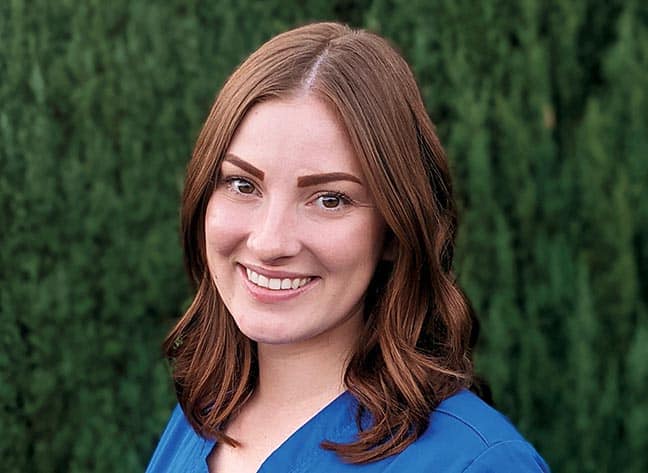Citrus College program prepares students to pursue health care degrees

Chloe Haskin, a graduate of the Citrus College Pre-Allied Health program, will earn her second degree from the college in June 2022.
by Laura J. Bollinger, Citrus College Governing Board Member
Chloe Haskin has found her calling. After completing her associate degree in nursing this June, the 28-year-old Citrus College student will transfer to Azusa Pacific University to pursue a bachelor’s degree in the same field. Her ultimate goal is to earn a master’s degree and become a family nurse practitioner. “I believe I will be able to make a true difference in people’s lives,” she said.
Despite this enthusiasm and determination, Haskin’s road to academic success was not always guaranteed. Growing up in a single-parent, low-income home, she never believed college was an option. However, Citrus College’s pre-allied health degree program changed her educational and professional trajectory.
Pre-allied health is an academic pathway designed for students interested in a career in allied health care fields, such as nursing, dental hygiene, medical laboratory technology, physical therapy and more. By pursuing an Associate of Science Degree in pre-allied health, students receive the strong biology and chemistry foundation needed to be successful in many health care professions. After completing the required coursework, they are ready to enter registered nursing programs or transfer to four-year colleges and universities.
Haskin is one of many students who have used the college’s pre-allied health degree option as a stepping stone to academic and professional advancement. A rigorous and demanding program, it enrolls an estimated 400 students each year — a number that has increased by 400% over the last 25 years.
To earn a pre-allied health degree, students must complete general education requirements, as well as human anatomy, human physiology, microbiology and chemistry classes. Among other requirements, they must earn a C or better in each course and maintain an overall GPA of at least 2.0 in all degree-applicable work.
Although the coursework can be challenging, the program’s faculty and staff are committed to helping their students achieve success. “Most of the faculty are on a first-name basis with their students,” said Arnold Kondo, biology instructor at Citrus College. “No need to intimidate them with the title of professor or doctor. We are just normal people trying to help them make progress on their academic paths.”
As a result of the individualized attention students receive, they learn to apply their knowledge of anatomy, physiology and microbiology concepts to more advanced courses. They also learn to work safely in a laboratory or clinical setting and to develop strong communication skills. In fact, some graduates later return to the program and serve as mentors to other aspiring health care professionals.
This is exactly what Haskin has done. After completing her pre-allied health degree and entering the Citrus College Registered Nursing program, she returned as a guest speaker and answered questions from the next generation of students. “The amazing faculty members at Citrus College have helped me become someone who truly believes in pursuing and achieving her dreams,” she says. “I thank them every day for their ability to challenge students and watch them blossom into amazing health care professionals. Because of them, I not only received knowledge, I grew as a person as well.”
As Claremont’s representative on the Citrus Community College District Board of Trustees, I am proud of the progress taking place in the Citrus College pre-allied health program, and I am grateful to the faculty, staff and students for their great work. Because of their commitment to excellence, Citrus College will continue to produce skilled health care professionals well into the future.







0 Comments